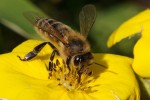News
2013-02-05 | permalink
North New Zealand councils to consider prohibiting commercial outdoor uses of GMOs
Councils to consider prohibiting commercial outdoor uses of GMOs in Northland and Auckland and requiring consents for outdoor field trials
An inter-council working party, representing all local authorities in Northland and Auckland, has recommended to member councils that they consider regulating the outdoor use of GMOs under the Resource Management Act through provisions in their planning documents. This would involve inserting objectives, policies and rules in existing district plans in Northland and in Auckland Council’s new Unitary Plan prohibiting the release of genetically modified organisms to the environment and making field trialing of GMOs a discretionary activity, subject to strict liability conditions for any environmental or economic harm that may eventuate.
2013-02-05 | permalink
The state of play: genetically modified rice
People often argue passionately for or against genetically modified crops. Rice Today’s aim here is not to take sides in a debate that has often generated more heat than light, but rather to look at the facts - what is actually happening in relation to GM rice with a separate focus on work underway at the International Rice Research Institute. [...] As of December 2012, commercialized GM rice had not yet become a reality—which means, farmers aren’t growing it and consumers can’t eat it yet. [...] Nevertheless, R&D on GM rice continues to advance in both the public and private sector around the world.
2013-02-04 | permalink
Azerbaijan introduces compulsory licensing of GMO trade and use
Turnover of genetically modified organisms in Azerbaijan has been included in the list of activities subject to compulsory licensing. The Azerbaijani parliament has passed today the amendments to the Law on the List of Goods in Public Circulation & Subject to Getting a Special Permit for Use.
2013-02-04 | permalink
Russia: Compulsory registration of GMO products
A bill to introduce compulsory registration of all products containing GM-components is in the final stages of adoption by the Russian parliament. [...] “Already 10 varieties of genetically modified crops have passed certification in Russia. And these are only crops that have been in use for a long time abroad without any negative consequences for human health. I think that GM crops are already cultivated in Russia, but until now this area has not been under our control” - Nikolai Vlasov Deputy Head of Russian veterinary watchdog Rosselkhoznadzor report.
2013-01-29 | permalink
EU Commission fails to ban bee-killing pesticides
 Pesticides pose a risk to honey bees (Photo: Mamboman1)
Pesticides pose a risk to honey bees (Photo: Mamboman1)
The European Commission announced on Monday that, in response to a report from the European Food Safety Authority (EFSA) identifying risks posed to bees by ‘neonicotinoid’ pesticides, it will start to take some protective measures. However the Commission did not go far enough to placate environmentalists who, along with the EFSA itself, had called for a complete ban of neonicotinoid pesticides. According to the EFSA report, these widely-used insecticides affect the central nervous system of insects, causing paralysis and death. Recognising this concern, Health and Consumer Affairs Commissioner Tonio Borg said the Commission “will propose a series of ambitious but proportionate legislative measures”. However, he was criticised for stressing that “a total ban would not be justified.” Last week, in a debate in the European Parliament's environment committee, other opinions were voiced. Green MEP Bart Staes said: “While scientists and beekeepers have been sounding the alarm for almost two decades, there is now a wide and growing body of evidence on the devastating impact of neonicotinoids on bee populations. The only responsible course of action is to immediately push ahead with an EU-wide moratorium on neonicotinoids.” On 31 January, EU officials will discuss neonicotinoids further, and plan to announce an action plan following the discussions. It is generally accepted that the decline of bee populations poses a serious threat to agriculture. Two thirds of crops humans use for food production depend on pollination by insects such as bees. According to a UN report, the work of bees and other pollinators is worth 153 billion euros per year to the global economy.
 Voxy, New Zealand: Councils to consider prohibiting commercial outdoor uses of GMOs
Voxy, New Zealand: Councils to consider prohibiting commercial outdoor uses of GMOs